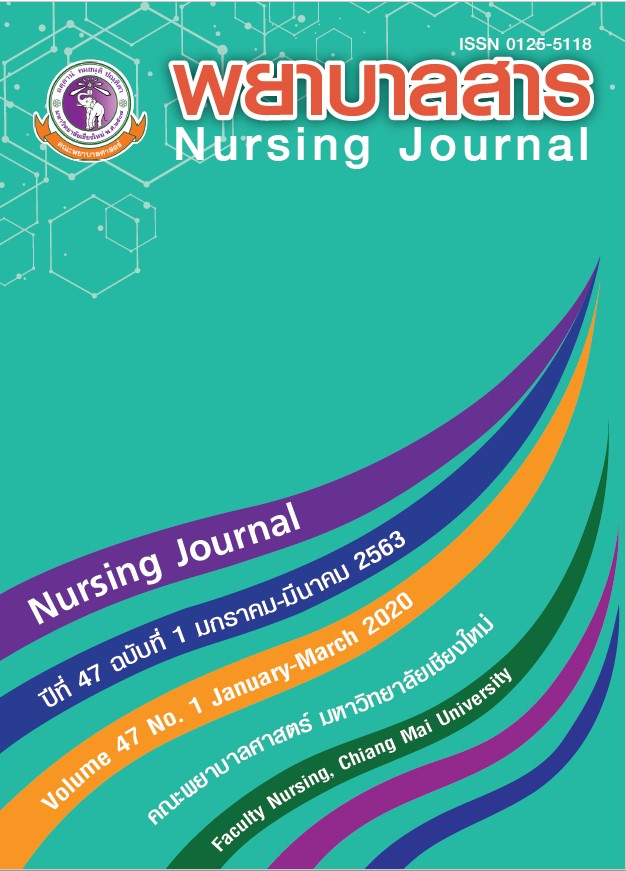Effects of a Breastfeeding Promotion, Support, and Protection Program for Registered Nurses in the Northern Thailand
Keywords:
Program, Breastfeeding, Registered nurse, Knowledge, AttitudeAbstract
Breastfeeding has benefits to both child and mother, including benefits to society and nation as it is an initiation of health promotion and improving the quality of life for the population. In Thailand, breastfeeding has been promoted for a longer period of time but the exclusive breastfeeding rate is still lower than other countries. Nurses play an important role in the breastfeeding promotion, support, and protection. This quasi-experimental research using one group pretest-posttest design aimed to examine the effects of a breastfeeding promotion, support, and protection program for registered nurses in Northern Thailand. The participants were 66 registered nurses working in public hospitals located in Northern Thailand whose practices were relevant to breastfeeding. A total of 66 registered nurses participating in the training program were included in this study without sample size calculation as it was the target number of participants defined by the grantor and the Thailand Nursing and Midwifery Council. The research instruments consisted of a manual for trainers and additional materials which were created by a production team and nursing instructors from five universities. The data collection tools consisted of 1) the questionnaire assessing nurses' knowledge of breastfeeding promotion, support, and protection produced by Parnnarat Sangperm (2014) and 2) the questionnaire assessing nurses’ attitude of breastfeeding promotion, support, and protection produced by Parnnarat Sangperm (2014). Data were analyzed using descriptive statistics and repeated measures of ANOVA.
The results of study showed that:
- Immediately after attending the program, the mean knowledge score and the mean attitude score of the registered nurses was significantly higher than that of before attending the program (p < 0.05).
- At 6 months after attending the program, the mean knowledge score and the mean attitude score of the registered nurses was significantly higher than that of before attending the program (p < 0.05).
The findings of this study reveals that breastfeeding promotion, support, and protection program can be used as guidelines for the improvement of nurses’ knowledge and attitude in order to enhance the competency in the promotion of breastfeeding.
References
ACOG Committee Opinion No. 361: Breastfeeding: Maternal and Infant Aspects. (2007). Obstetrics & Gynecology, 109(2), 479. Retrieved from https://journals.lww.com/greenjournal/Fulltext/2007/02000/ACOG_Committee_Opinion_No__361__Breastfeeding_.64.aspx
Bernaix, L. W. (2000). Nurses’ attitude, subjective norms, and behavioral intentions toward support of breastfeeding mothers. Journal of Human Lactation, 16(3), 201-209.
Dennis, C. (2002). Breastfeeding initiation and duration: A 1990-2000 literature review.Journal of Obstetrics Gynecologic and Neonatal Nursing, 31, 12-32.
Gale, J., Fothergill-Bourbonnais, F., & Chamberlain, M. (2001). Measuring nursing support during childbirth. Maternal and Child Nursing Journal, 26(5), 264-271.
Haroon, S., Das, K. J., Salam, A. R., Imdad, A., & Bhutta, A. Z. (2013). Breastfeeding promotion interventions and breastfeeding practice: A systematic review. BMC Public Health, 13(3), 520-537. doi:10.1186/1471-2458-13-53-520
Hong, T. M., Callister, L. C., & Schwartz, R. (2003). First-time mothers’ views of breastfeeding support from nurses. Maternal and Child Nursing, 28, 10-15.
Jordan, S. J., Cushing-Haugen, K. L., Wicklund, K. G., Doherty, J. A., & Rossing, M. A. (2012).Breast-feeding and risk of epithelial ovarian cancer. Cancer causes & control, 23(6), 919-927.
Kantaruksa, K., Sansiriphun., & Prasitwattanaseree. (2014). Development of breastfeeding promotion models for instructors, Faculty of Nursing, Chiang Mai University and nursesMaharaj Nakorn Chiang Mai Hospital. Nursing Journal, 41(5), 159-169. (In Thai).
Laanterä, S., Polkki, T., & Pietila, A.-M. (2011). A descriptive qualitative review of the barriers relating to breast-feeding counselling. International Journal of Nursing Practice, 17(1),72-84. doi:10.1111/j.1440-172X.2010.01909.x
Lawrence, R. A., & Lawrence, R. M. (2011). Breastfeeding a guide for the medical profession (7th ed.). Maryland Heights: Mosby.
McInnes, R. J., & Chambers, J. A. (2008). Supporting breastfeeding mothers: Qualitative synthesis.Journal of Advanced Nursing, 62(4), 407-427.
Mohammad, Mousa. A. (2014). Breastfeeding for the Prevention of Breast Cancer: Evidence Based Practice. Middle East Journal of Age & Ageing, 12(4), 8-10.
Moran, V. H., Bramwell, R., Dykes, F., & Dinwoodie, K. (2000). An evaluation of skills acquisition on the WHO/UNICEF breastfeeding management course using the pre validated breastfeeding support skills tool (BeSST). Midwifery, 16(3), 197-203.
National Statistic office, Statistical Forecasting Bureau, The government complex. (2013). Major findings of multiple indicator cluster survey 2012. Bangkok: Text and Journal Publication.
Panbangpra, S., & Sangperm, P. (2013). Knowledge, attitude, and practice of breastfeeding promotion among nurses in private hospitals. Journal of Nursing Science, 31(1), 70-79. (In Thai).
Sangperm, P. (2014a). The Questionnaire assessing nurses’ knowledge of breastfeeding promotion,support, and protection. Bangkok: Faculty of Nursing, Mahidol University. (In Thai).
Sangperm, P. (2014b). The Questionnaire assessing nurses’ attitude of breastfeeding promotion,support, and protection. Bangkok: Faculty of Nursing, Mahidol University. (In Thai).
Stuebe, A. M., & Schwarz, E. B. (2010). The risks and benefits of infant feeding practices for women and their children. Journal of Perinatology, 30(3), 155-162. doi:10.1038/jp.2009.107
Tangsuksan, P., & Ratinthorn, A. (2011). Experiences and contextual factors related to exclusive breastfeeding in full-time working mothers. Nursing Science, 29(3), 51-62. (In Thai).
UNICEF. (2013). Breastfeeding. Retrieved from http://unicef.org/nutrition/index_24824.html
Wong, D. L., Perry, S. E., Hockenberry, D. L., & Wilson, D. (2006). Maternal child nursing care(3rd ed.). St Louis: Mosby.
World Health Organization. (2014). Breastfeeding. Retrieved from http://www. Who.int/maternal_child_adolescent/topics/child/nutrition/breastfeeding/
Downloads
Published
How to Cite
Issue
Section
License
บทความที่ได้รับการตีพิมพ์เป็นลิขสิทธิ์ของวารสารพยาบาลสาร
ข้อความที่ปรากฏในบทความแต่ละเรื่องในวารสารวิชาการเล่มนี้เป็นความคิดเห็นส่วนตัวของผู้เขียนแต่ละท่านไม่เกี่ยวข้องกับมหาวิทยาลัยเชียงใหม่ และคณาจารย์ท่านอื่นๆในมหาวิทยาลัยฯ แต่อย่างใด ความรับผิดชอบองค์ประกอบทั้งหมดของบทความแต่ละเรื่องเป็นของผู้เขียนแต่ละท่าน หากมีความผิดพลาดใด ๆ ผู้เขียนแต่ละท่านจะรับผิดชอบบทความของตนเองแต่ผู้เดียว






